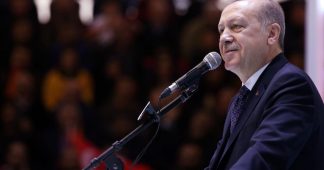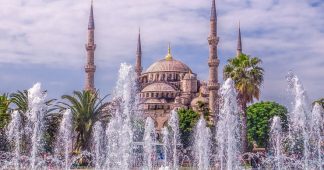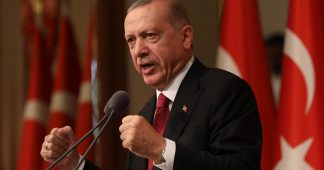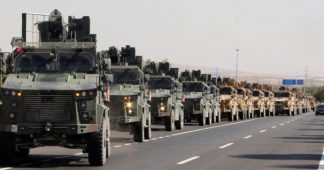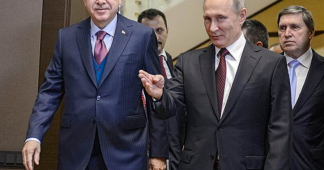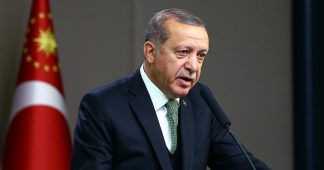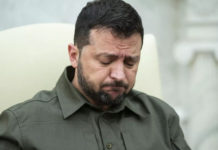By Dimitris Vlahoutsikos
In April, when Turkey celebrated the 100th anniversary of the National Parliament. The Daily Sabah newspaper published an article “The Dream of Great Turkey Reborn” on this occasion. In it, the author, prominent Islamist Ihsan Aktas, says without a doubt, despite the fact that after the fall of the Ottoman Empire the territory of Turkey shrank, “thanks to the Justice and Development Party’s (AK Party) almost two-decade-long stay in power, the dream of a “great Turkey” was reborn”. The same idea was expressed by the Turkish President Recep Tayyip Erdogan, who on 24 April said that “Turkey, the first time since the Second World War, has gained opportunity to take part in the center of a restructuring process at the global level”. (https://www.birgun.net/haber/
To understand Turkey’s limits of ambition, let’s go back a hundred years.
On February 12, 1920, the parliament of the Ottoman Empire published one of its last decisions, which was named Mîsâkıı Millî – National Pact. This anniversary was actively celebrated in Turkey, which is not by chance.
At that time, a number of deputies close to the future of Ataturk – Mustafa Kemal decided to seek by all means to preserve in Turkey a number of territories, which are now part of other states. These are Western Thrace (now part of Greece), 12 Dodecanese Islands, Cyprus, Georgian Adjara, the north of modern Syria with Aleppo and the north of Iraq with Mosul.
After more than a hundred years, the ruling Turkish elite actively remembers the Mîsâkı Millî as a kind of covenant that has yet to be fulfilled, bringing all the territories marked a hundred years ago back under Turkish control. President Erdogan referred to this document in 2016, 2017, 2018 and 2019.
Thus, in 2016, the Turkish leader stated that “If we grasp and understand Misakı Milli, we understand what our responsibility is in Syria, our responsibility is in Iraq”. (http://www.cumhuriyet.com.tr/
In early February, Erdogan, citing National Pact, criticized the opposition party CHP, which had disapproved his military actions in Idlib. (http://beyazgazete.com/video/
According to former Turkish Prime Minister Binali Yıldırim, the agreement signed between Turkey and the Libyan Government of National Accord in November 2019, which gave Ankara the opportunity to claim for a vast area of the Mediterranean Sea, can also be considered a kind of implementation of the Mîsâkı Millî. (https://www.yeniakit.com.tr/
Execution of the Covenant
If you look carefully at the map of Turkish military and economic presence outside the country, it is not difficult to notice that Ankara consistently and persistently implements the oath of the last deputies of the parliament of the Ottoman Empire.
The 100-year-old document can perfectly explain the situation in Idlib. Turkey controls vast territories in northern Syria, while Aleppo was finally unlocked only a few days ago during Operation Idlib Dawn. Turkey is fighting against formations close to the Kurdistan Workers’ Party in both Syria and Iraq, while special relations with the Barzani clan make Iraqi Kurdistan partially dependent on Ankara. Ankara has controlled Northern Cyprus since 1974, complaints that the Greek islands of the Aegean Sea are “too close” to the Turkish shores are voiced regularly and nowadays Turkey pretends on a vast part of seashores in Eastern Mediterranian.
In Georgian Adjaria, Ankara’s Turkish economic presence and attempts to Islamise the region (building a new mosque) are so strong that local residents are concerned. Back in 2016, Recep Erdogan, speaking, among other things, about this Georgian region, stated that “Our physical boundaries are different from the boundaries of our heart”. At that, the Turkish leader mentioned that “Georgia, Ukraine, Crimea, Azerbaijan, Karabakh, the Balkans, North Africa” are the regions to which Turkey feels special responsibility. (https://www.tccb.gov.tr/en/
The Turkish military presence in Libya, Erdoğan now also explains by the references to the past, namely the location of the territories of Tripolitania and Cyrenaica within the Ottoman Empire. In January, the Turkish president stated that Turkish “are there to assist in the training [of GNA forces]. We have a history of 500 years”. ((https://www.voanews.com/
It is noteworthy that Libya was the last Ottoman possession in Africa that it lost.
Neo-Osmanism as neo-imperialism
Very often, the analysis of Turkey’s modern foreign policy as a neo-Ottomanist policy ends with the statement that Erdogan and his party (AKP) are driven by nostalgia for the restoration of Ankara’s influence in the former regions of the Ottoman Empire. However, this analysis alone cannot explain Turkey’s military, political and economic expansion. The theory of imperialism may come to the aid.
As noted by Turkish political scientist Gönenç Uysal, Turkey has the status of a “peripheral capitalist state” in the modern capitalist world system, which recognizes the hegemony of the top of the world hierarchy (U.S., hence the fact that Turkey does not withdraw from NATO despite many contradictions with the United States). (https://www.opendemocracy.
However, Ankara is trying to use its military and economic power to impose unequal relations on countries that are lower in the world capitalist hierarchy. For this purpose, military and political mechanisms and instruments of cultural influence are used as levers. But both inside and outside the country, it is very convenient to explain the expansion with appeals to the historical past.
“Turkey’s dependent relations with the Western countries have been strengthened with Turkey’s economic, political, and military commitment to the Western bloc; for example, its commitment to the IMF, World Bank, NATO, and the EU accession process”. – The author writes that “the AKP’s foreign policy in the Middle East has sought to promote the economic interests of Turkish firms while aiming at political and military domination in the region”.
Another Turkish left-wing political scientist Güneş Gümüş uses the notion of sub-imperialism to describe this order of things.
Thus, Turkish lira has long been circulating as currency in parts of Syria controlled by Ankara, and the region itself has become a sphere of Turkish business expansion. For example, the other day, a former member of the Turkish parliament from the ruling Mahmut Sami Mallı party won a $7 million tender for the construction of a water pipeline in Syria. (https://www.birgun.net/haber/
Libyan Case
The example of Libya can be considered illustrative. In that country, Turkey supports the so-called Government of National Accord (GNA) in Tripoli. Formally it is called internationally recognized or even recognized by the UN, although the entire legitimacy of the GNA was based on the 2015 Libyan Political Agreement, and according to this very agreement the mandate of this government expired in early 2018.
Claims that Turkey supports an allegedly “UN-recognized government” in Libya do not prevent Ankara from violating UN rules when it benefits from it. This is, for example, a violation of the arms embargo on Libya. Turkey was accused of this last year (https://www.theguardian.com/
According to the *entirely unverified* pro-LNA reports (important to highlight due to the insane list), the following was unloaded at #Misrata Port:
-100 ton light weapons&ammo
-4 Leopard 1T 'Volkan'
-2 T-300 Kasırga/TRG-300 MBRL
-10 Otokar Arma
-10 FNSS ACV-15
-700 soldiers
2/2— Oded Berkowitz (@Oded121351) February 23, 2020
According to Recep Erdogan, regular Turkish troops are also present in Libya, along with militants from the so-called Syrian National Army. At the same time, the GNA, with the support of Turkey, regularly violates the truce, supported by the UN Security Council after the conference in Berlin on January 19.
Last November, Turkey signed two memorandums with the GNA – one on military support and the other on demarcation at sea. According to the agreement on demarcation of maritime boundaries, the GNA supported Turkey’s claims to part of the waters of Greece and Cyprus. Moreover, Ankara intends to exploit possible net and gas reserves on the Libyan coast together with Libya.
In fact, in exchange for military support Ankara imposed a treaty on Tripoli aimed at gaining control over a significant part of the country’s oil and gas wealth and forced the head of the GNA Fayez Sarraj to support his territorial claims to the neighboring countries. This is a classic example of imperialist policies and the transformation of the TNC-controlled part of Libya into a Turkish semi-colonial.
The fact that we are talking about imperialism that is more inclined to embed into the existing structures of hegemony than to put them into question is evidenced by the statement of GNA Interior Minister Fathi Bashagha, who on February 21 declared about the possibility of creating a U.S. military base in Libya. It is also indicative that in 2011, Turkey joined forces with imperialist Western powers in overthrowing Libyan leader Muammar Gaddafi.
The way Turkey’s interests in Libya at least partly coincide with those of the United States is also shown by the history of Russian Sociologist Maxim Sugaley and his interpreter Samer Sweifan, who were arrested in Tripoli last spring and are now being held in Mitiga prison, controlled by the pro-Turkish government of Tripoli. Recently, a Russian federal channel aired a film about them (https://alarab.co.uk/%D8%B4%
As The New York Times notes “Tipped off by American intelligence, according to a person involved, a militia allied with the Tripoli provisional government eventually detained Mr. Shugaley and his interpreter”. (https://www.nytimes.com/2020/
One of Turkey’s goals in Libya – purely economic – is to fully control the country’s market and establish Libya’s economic dependence on Turkey. On May 4, Murtaza Karanfil, head of Foreign Economic Relations Board (DEIK) Turkey-Libya Business Council said that “the new normal will significantly change the supply chain and Turkey can grab the 25% market share of China and Italy in Libya”.
Against the background of what and for what purposes Turkey is doing in Libya, it was strange to hear Erdogan’s statements during his last visit to Algeria condemning European colonialism in Africa and specifically French colonialism in Algeria (statement about the death of 5 million Algerians at the hands of the French).
For the current Turkish leadership and its supporters among political scientists and experts, only the actions of Western powers are considered colonialism. The fact that vast territories in Europe, Asia and Africa were conquered by force and their inhabitants were subordinate to Turks is simply ignored, not to mention the Ottoman atrocities against Armenians, Assyrians or Greeks.
Besides, whatever the relations in the Ottoman Empire were a hundred years ago and more, now the common past is only an ideological justification of Turkish expansion into Africa. Turkish experts do not hide the fact that Ankara needs the same in Africa as Western countries – markets, expansion of political, economic and military presence and control over resources, primarily oil and gas. That is why Turkey is so interested in maintaining control over Libya and aims to develop oil and gas fields in Somalia.
Somalia invites Turkey to conduct oil exploration in its seas; Turkish President Tayyip Erdogan says they will honour the invitation. pic.twitter.com/FbkQiYRaNc
— Robin Njogu (@robinnjogu) January 21, 2020
Thus, when viewed in detail, Turkey’s expansionist policy is no less imperialistic than that of Western countries, although Ankara seeks to prove the opposite. Moreover, due to its use as an instrument of Islamism, this form of imperialism and neocolonialism may have an even more negative impact on other countries’ societies by inciting hatred and religious discord.
